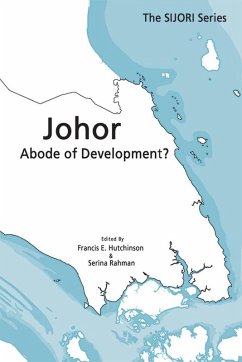In 1990, the Malaysian state of Johor-along with Singapore and the Indonesian island of Batam-launched the Growth Triangle to attract foreign direct investment. For Johor, this drive was very successful, transforming its economy and driving up income levels. Today, Johor is one of Malaysia's "e;developed"e; states, housing large clusters of electrical and electronics, food processing, and furniture producing firms. While welcome, this structural transformation has also entailed important challenges and strategic choices. After three decades, Johor's manufacture-for-export model is under question, as it faces increasing competition and flat-lining technological capabilities. In response, the state has sought to diversify its economy through strategic investments in new, mostly service-based activities. Yet, Johor retains pockets of excellence in traditional sectors that also require support and policy attention.The state's economic transformation has also been accompanied by far-reaching political, social, and environmental change. Not least, Johor's growing population has generated demand for affordable housing and put pressure on public services. The strain has been exacerbated by workers from other states and overseas. These demographic factors and large-scale projects have, in turn, put stress on the environment. These economic and social changes have also had political ramifications. While Johor is a bastion of two of the country's oldest and most established political parties, the state's large, urban and connected electorate has made it hospitable terrain for new political organisations. Beyond electoral politics, Johor is also the home of a powerful and influential royal family, with very specific ideas about its role in the state's political life. Building on earlier work by the ISEAS - Yusof Ishak Institute on the Singapore-Johor-Riau Islands Cross-border Region, this book focuses on this important Malaysian state, as it deals with important domestic challenges on one hand and strives to engage with international markets on the other."e;I have always felt that there are many more complementarities possible between Singapore and Johor. This would be to the benefit of both economies, but the political division between the two was just too great. The two economies lived adjacent but separate lives-Singapore looking out to the world and Johor looking north-until initiatives such as the Iskandar Malaysia development corridor began to change things significantly. The concern now is that the pendulum may have swung too much the other way, driven by the huge income and price differentials as well as Singapore's global city status. Francis and Serina's compilation is a welcomed attempt at understanding Johor in a much more comprehensive manner; not just its changing economy but how its politics and society have been impacted by these changes - which is a more endogenized view of economic integration."e; - Dr Nungsari Ahmad Radhi, former MP Balik Palau and Executive Director, Khazanah Nasional"e;Drawing on the expertise of internationally known specialists, this insightful collection explores the multiple ways in which Johor's economic development has influenced the contemporary political scene, and the effects on local society and the environment. Skillfully edited and meticulously researched, Johor: Abode of Development? is not merely required reading for anyone interested in contemporary Malaysia, but will be of immense value to historians of the future."e;-Barbara Watson Andaya, Professor of Asian Studies, University of Hawai'i
Dieser Download kann aus rechtlichen Gründen nur mit Rechnungsadresse in A, B, BG, CY, CZ, D, DK, EW, E, FIN, F, GR, HR, H, IRL, I, LT, L, LR, M, NL, PL, P, R, S, SLO, SK ausgeliefert werden.


